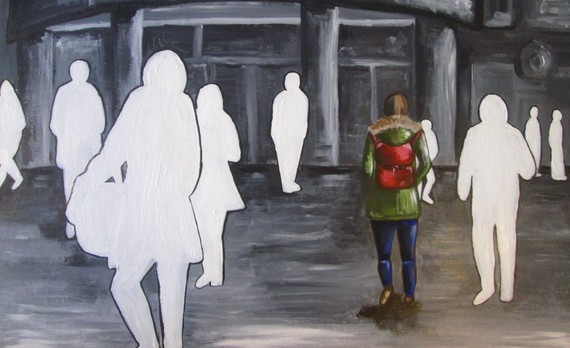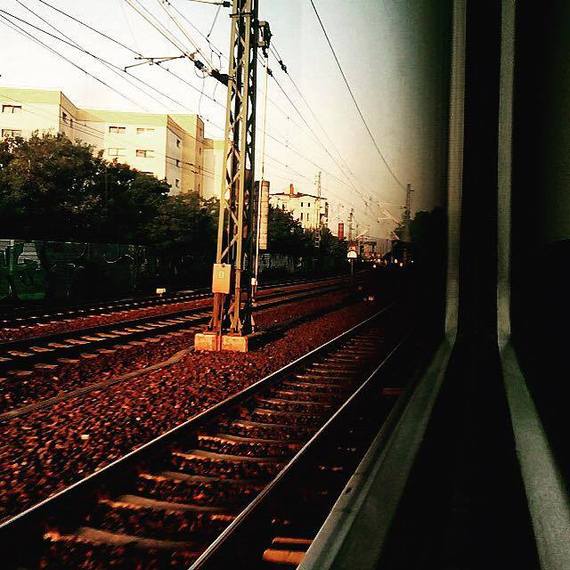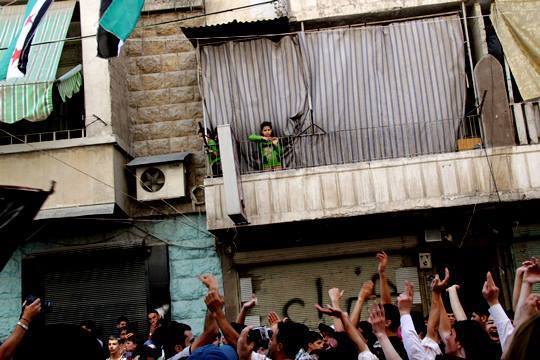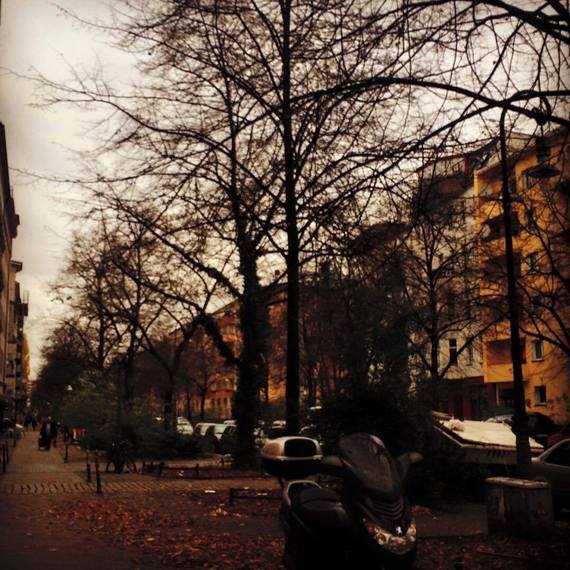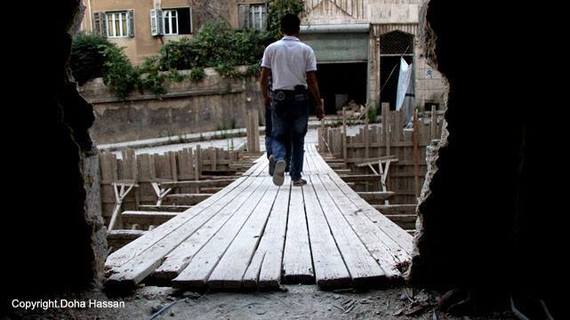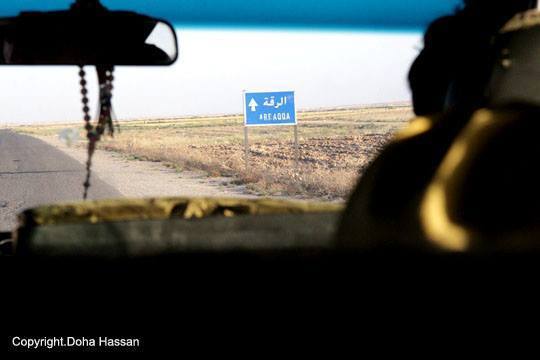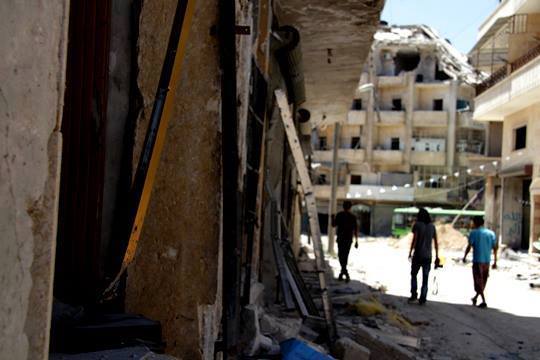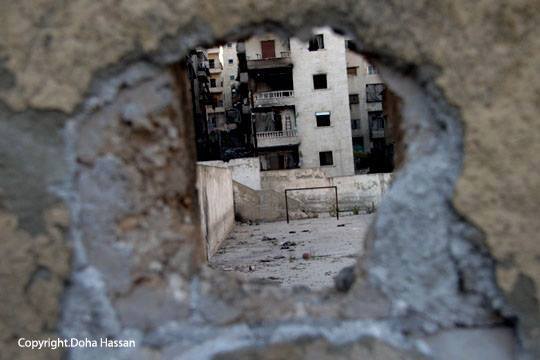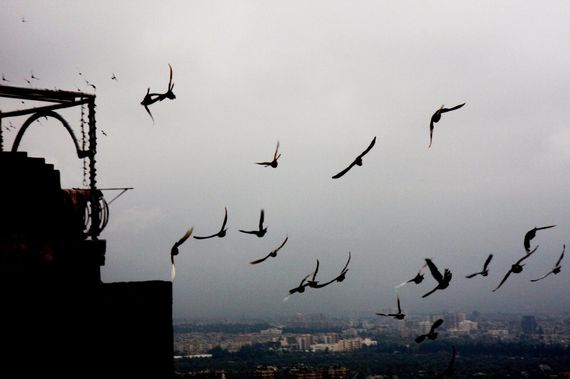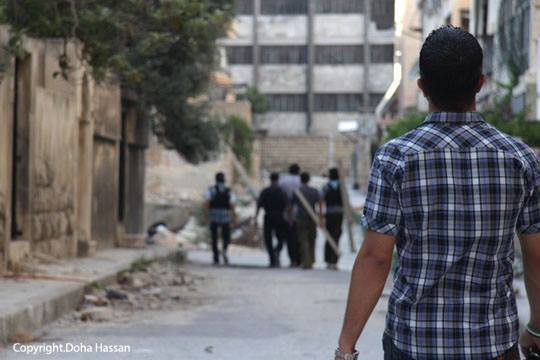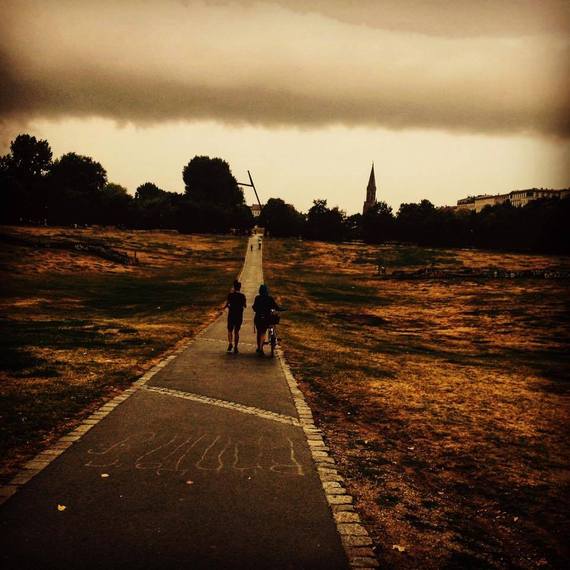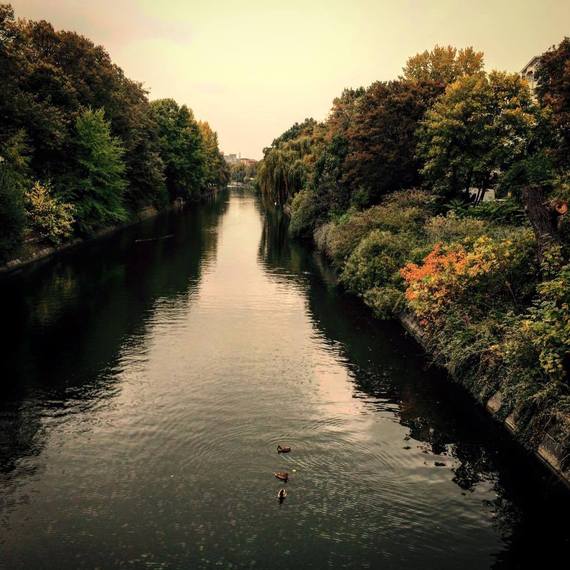The following article was originally published in Arabic on September 1, 2015 on the website Al Jumhuriya. The author, Doha Hassan, is a young Syrian-Palestinian journalist who writes for numerous Arabic and English periodicals.
In this personal essay, she tells us about her new life as a Syrian refugee in Germany. It's the painful experience of being abruptly uprooted and having to adapt to exile -- the multiple facets of which force the refugee to start questioning her transformed identity. While Doha is physically stuck in Germany, she obsessively follows news from back home and yearns for a familiar environment. All photos are courtesy of Doha Hassan.
The subway is crowded which is quite unusual. It's been four months now, but all those faces still strike me as unfamiliar. I take out my cellphone and raise the volume of the music. I take a deep breath and plunge into my Facebook newsfeed in order to follow what is known to me, in order to stick to the familiar. It's become a habit of mine when I stroll through town: I bury my face in my cell phone screen and dissociate from my immediate environment.
All of a sudden, the music stops and the screen goes black. I can hear people conversing around me, others are whispering strange and foreign words of which I understand nothing. A man comes on board, he's speaking very loudly. He seems completely drunk and I think he's repeating the same sentence over and over again. At least, that's what it sounds like to me.
A young man helps him sit down and starts talking to him. It becomes a collective conversation between a group of passengers and this drunk man. In this back and forth, I can only understand a few words that I have picked up since my arrival. Someone turns toward me and says something. I look at him: he's pointing to my hand. Maybe he's asking me what time it is? It's 3 pm. I almost say it in German but I can't bring myself to do it. I don't speak German. I show him three fingers to explain that it's three in the afternoon. The man then says in English: "No, you dropped your keys."
My tongue is incapable of uttering anything sensical. Social interaction through verbal communication is still nonexistent. I'm not capable of communicating verbally yet, even though I can understand all the signs and movements that surround me. I am like a few months-old baby. How is it that I am struggling with these problems of pronunciation at the ripe age of 30? This is what exile inflicts on a person.
We are born several times: it's not a metaphor. As fate wanted, I was reborn at the end of 2012. I emerged out of my natural solitude and my first alienation. It was a laborious childbirth! A newborn still so weak! So much worrying and so much fear.
It definitely wasn't easy to get separated from those with whom I had shared my childhood, my adolescence and my youth. We wore the same uniform, we experienced the same life events, we acted in the same manner, learned the same things, had the same customs, in short we had a common culture whose threads connected us. We had very simple dreams at the time because few opportunities presented themselves to us. It was inevitable that we would end up resembling each other so much.
To exist within a group is to create a sense of belonging and loyalty. This also gave us a sense of security, strength and satisfaction. This is why to act out a new individuality seemed to me a drawn-out, extremely long process. And then the second alienation came, the real one. I had become an individual but the path felt long at the time. I was going to grow up very slowly.
In exile, something incites us to only ever write about exile and homeland, what we've gained and what we've lost.
At night, immersed in my new exile, I force myself to adapt, to integrate myself but also to take some distance from the person I used to be. All of a sudden, I receive a message: the Syrian regime has arrested my friend Lana Mardani in Damascus. Why? She was providing relief to children.
I ran out into the street in a rush, into an unfamiliar neighborhood. I started walking without a destination in mind and I read and reread the message, several times. I looked around me: I'm far away from everything, totally helpless.
I was returning the phone to my pocket when I suddenly heard someone say in English: "Doha, how are you? What happened to the papers, to your refugee status?" It was a friend I had recently met. "They've arrested Lana," I said to him. "Who's Lana?" he asked me. "Forget it! I'm making progress with the papers. I have to go. Let's speak later."
I have been uprooted from my social, economic and political environment and forced to live in a place where I don't have anything in common with anyone, whether socially or culturally. We don't have any common language. Their way of thinking, of feeling, of behaving and making decisions: all of it is foreign to me. I am in a cognitive coma.
Far away from home, I have lost the ability to write. I've lost my enthusiasm, my responsiveness. Worse still: exile almost made me lose my memory. My memories were torpedoed. Still clinging on to some personal memories and to our collective memory, I understood where this feeling of violent alienation comes from. The obstacle in my way is big.
Exile has many facets -- just as many as there are exiled faces in this world. In exile, something incites us to only ever write about exile and homeland, what we've gained and what we've lost.What we're under the illusion of having gained and what we think we've lost. Questions of exile are worried, hurried, fearful and never ending.
I have read many such questions in the last issue Jumhuriya has dedicated to the subject of exile. The answers to my questions are even more questions. They are questions about "us" as Syrians, not really about "I." Questions about the exile and the homeland that lives inside each individual.
Who am I? It's a nagging question like a pain that won't go away.
The psychoanalyst Erich Fromm has written in his book The Sane Society: "The birth of man is, in itself, an exodus from the natural homeland in which he's torn off from his natural environment. This breakout is terrifying because if man is uprooted then where is he going? And who is he really?"
In texts about exile, the general environment always takes precedence over your personal state. The general environment we've left behind, the one which gave you the feeling of belonging to a group through memory and collective experience. This sort of security is lost in exile, in the unknown. The past, shiny, is the only certainty to hold on to.
I stuck my face in the mirror and then I stepped back, like those people who, when they visit museums, plunge into the works of art in deep meditation. I repeated this movement several times. I just turned 30 and this has left many marks on my face. I hadn't been aware of it yet: it's very striking.
I have made some serious decisions about my personal and professional life, about my beliefs, my opinions and particularly my expectations for the day I would turn 30. And my expectations have been realized to a certain extent.. Although deep down inside, I feel like I am barely 5 months old.
Who am I? It's a nagging question like a pain that won't go away. This question imposes itself in exile when the exiled person realizes he's on his own and without defense. The individual is separated from others, it's a fact. We're no longer protected embryos, we're alive, outside, confronted with others. You may be an adult, but exile is akin to severing the umbilical cord.
"Since my arrival to Europe, I decided to begin a new life. This requires some sort of adaptation: learning a language, a way of thinking, how to comport oneself. I have to take on new colors like a chameleon. I have to be here and I can't return home so I have to forget home, turn the page. I have to be realistic," says Mahmoud, a refugee and an ex-prisoner in the jails of the regime.
Mahmoud attempts a necessary adaptation to his new environment. He actively represses his own feelings, the feelings he had before exile. He refuses to take part in any conversation about his country and his tone turns mocking when we mention to him nostalgia or old friends. All of this has created a feeling of self-repression, Mahmoud has become introverted. It has also created a certain animosity in him. Mahmoud is insomniac and complains about it all the time. This "repressed material" is not inert, it's constantly moving and never ceases to manifest itself with force in the personal life of the exiled, in his soul and in his body. We try to ignore it in order to protect ourselves, but it only makes us that much angrier.
"I've met a group of Syrians and we spend all our time together. I don't want to adapt to a new place, I don't want to learn 'their' language because I know this is only temporary, just until our return," says Sarah, a Syrian refugee who arrived to Germany last year.
Sarah does not want her individuality. She wants to stay safely cocooned within the group and to keep her original ties to the homeland. It seems that being part of a unified and familiar unit is her way of struggling against the intolerable feelings of helplessness, of anxiety and fear, in this place that is too overwhelming and complicated for her.
* * * *
My phone's ringing interrupts us, me and myself, while we are preparing breakfast.
"Where have you been hiding for three days?"
I hear myself answer with surprise: "What? Three days."
"Well yeah, three days. What's happening? Are you having problems?"
I look around me. A moment of silence.
I respond with hesitation: "No, everything is okay."
My friend then starts laughing: "You are isolating yourself, careful."
Silence again.
"No, I am reading and writing. I'm going out. I wander a bit. Don't worry."
"And who have you seen in the past three days?"
"No one!"
I hang up and I'm immediately overtaken by hysterical laughter. The thing is I didn't feel the passage of time and I never felt alone during those three days. There was me and myself and we both took part in a number of daily routine activities.
For a minute, I felt strong, like I had finally acquired an inner peace. I felt free, the kind of freedom that comes from one's reconciliation with oneself, when one accepts one's condition: isolation vis-a-vis one's entourage. This is when I fully realized who I was: my "everything."
The decision to lead this new life was never a personal decision. Yet, I am about to start this new life in a country I haven't chosen.
But my "everything" is ill, gravely ill, and it is still in its first phase of growth. It is constantly subject to bouts of fear, of anxiety, and to violent crises of nostalgia towards what is familiar and known.
An urge to indulge in helplessness without a doubt, an urge to settle for purely necessary and mechanical activities instead of life, an urge to go through the motions instead of really living. A desperate attempt to snap out of reality.
It's 10:00 am and I must pack my things to move again. I am signing a new lease for an entire year. A friend just sent me a message, a photo of a document he has just received in the mail. I look at it for a long time. A lot of words I can't decipher so I send it to a friend who can read German. She immediately calls me back: "Congratulations! You have been officially granted refugee status in Germany. No one will ever be able to kick you out of here."
Suddenly, silence. I stare at my computer screen and get bombarded with news headlines from a different planet. "86 decomposed bodies of Syrian refugees found in a lorry in Austria," "50 dead in Douma following a regime air strike," "Thousands of Iraqis demonstrating in the liberation square in Baghdad," "Lebanese security forces disperse a demonstration in Beirut with tear gas and water jets. Many protesters have been arrested."
I go back to my friend: "So I have the right to travel then?" She laughs: "You can go wherever you want, but you need a visa for countries in the Middle East. It's very difficult to obtain one." I look at my screen again: "Thousands of Lebanese people are demonstrating in Beirut against the corruption of the political elite." And my friend adds: "It's enough. Forget the 'over there.' Today, you are a citizen with the right to reside here. You have rights. You have a new life."
The decision to lead this new life was never a personal decision. Yet, I am about to start this new life in a country I haven't chosen. I'm going to learn its language, its laws, its traditions, its culture. This trajectory is inevitable.
Exile today is certainly different from that of past times. Exile in the past was certainly characterized by total isolation. But that doesn't make us any less exiled than the exiled individuals of yore.
* * * *
We are four million Syrian refugees scattered across lands of exile. Affected individuals, suffering deep within themselves. The physical and mental trauma washes over us from all sides.
We are victims of repression, of imprisonment, of destruction, of death.
We have been hunted and hounded.
We are forced to build a new life in the midst of an alien and harsh reality.
We are forced to adapt as if everything we've experienced to date was nothing but a dream, a nightmare of sorts. As if nothing ever happened. As if nothing was happening in our country.
We have been reborn on another planet.
Al Jumhuriya is a Syrian daily founded by a group of authors, journalists, bloggers and students. Its various contributors, some of whom are prominent figures in the Syrian opposition, like Yassin Al Haj Saleh, want to shed light on the history and culture of Syrian society in its various components in order to "liberate Syrian thinking within the framework of an independent media outlet".

